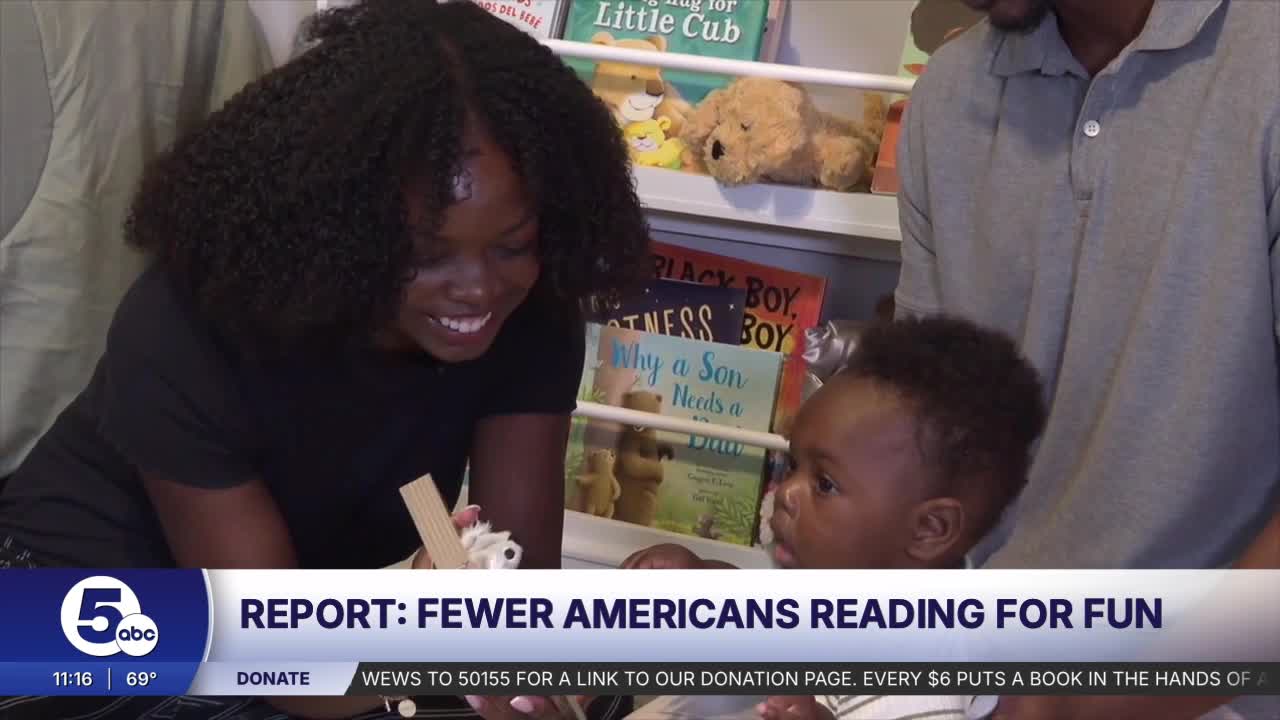EUCLID, Ohio — At seven months old, AJ Sheriff already has a shelf filled with stories – from the soft fabric ones that crinkle to sturdy board books designed for small hands.
His parents, Andrianna and Jerome Sheriff, try to fit in reading whenever they can. A few minutes in the morning, after waking up. Or late at night, if AJ’s struggling to sleep.
“Life is busy. Everybody has stuff to do. We all have work. But we just force it into the schedule, because it’s important,” Andrianna said of picking up a book.
A recent study shows that we’re doing that much less often.
The share of Americans who read for fun dropped by about 40% between 2003 and 2023, according to researchers from the University of Florida and University College London. Their analysis, based on data from the American Time Use Survey, covered books of all kinds – hard copies, audiobooks and e-books – plus newspapers and magazines.
Only 2% of survey participants read to a child on a given day, the researchers found. The rate of reading to kids hasn’t changed much over the last two decades. But the decline in adults’ reading for pleasure – and the message that sends – has childhood literacy experts worried.
“We’re definitely swimming against the tide,” said Joan Spoerl, a former kindergarten teacher and a longtime literacy champion. “Because technology has really been enticing for children – and adults.”
Spoerl runs Dolly Parton’s Imagination Library program in Cuyahoga County for the Literacy Cooperative, a nonprofit dedicated to improving rates of reading and writing. The program sends out free books each month in the mail to children, from birth to age 5.
Imagination Library is available across Ohio, where more kids are enrolled than in any other state. Roughly 60% of eligible children are participating. Local partner organizations, such as the Literacy Cooperative, want to see that number climb to combat troubling trends.
“In order to prevent low literacy in adulthood, we need to get things right in the early years,” said Spoerl, noting that two out of three kids in Ohio aren’t ready for kindergarten.
“Children, young children, need real interactions with real people,” she added. “Real objects. Real books. … The first 12 to 24 months are the critical window of opportunity for language development in the brain.”

AJ’s parents recognize that.
At 29, they’re bucking the trends that Spoerl frets about.
Andrianna works in marketing and communications at the Cleveland Public Library, where she’s surrounded by books. Jerome, a former sixth-grade teacher, has a similar job at the City Club of Cleveland, an institution devoted to free speech and critical thinking.
AJ got his first library card before he could even sit up. The bookshelf in his nursery is filled with a mix of classics like “If You Give a Mouse a Cookie” and recent books, including “Brown Sugar Baby” and “All the Greatness in You” – both featuring young Black boys on the covers.
“The representation is super important to us,” Andrianna said.
The family also signed up for the Imagination Library right away.
Each month, a book wrapped in plastic and addressed to AJ arrives in the mail. The early ones are designed to withstand some drool. They’re just right for that time when a kid wants to put everything in his mouth.
“Handling a book and chewing on it and playing around with it – that’s how young children learn,” Spoerl said.
She knows it can be tough for parents, grandparents and other caretakers to find the time to read. She suggests starting out with 15 minutes a day — at bedtime, during bathtime or even during idle moments between errands.
“Children crave their parents’ and caregivers’ attention more than anything in the world,” she said. “It is the greatest gift you can give to a child. They love your voice.”
Make reading a conversation by asking questions, giving babies and toddlers the chance to point at pictures and older children the opportunity to explore language, she said.
And if a child doesn’t seem interested in reading, try to sit nearby and read out loud for 10 or 15 minutes while they’re playing. Eventually, they’ll come around.
“The other thing I want families to know is to make it cozy, fun and joyful,” she said. “You don’t need to be quizzing your child. You don’t need to be asking them to read to you.”
Spoerl cites studies by Dr. John Hutton, a former University of Cincinnati researcher, and his colleagues that looked at how reading and screen time impact kids’ brains. Those studies show there’s no substitute for reading to children when it comes to laying the foundation for literacy.
“Tune in. Talk more. Take turns. Turn off screens,” she said. “And turn off background noise too, because young children can’t filter out background noise.”

In AJ’s nursery, Andrianna and Jerome settle down with him on a rug.
They pick up a copy of “Baby Koala,” a board book featuring a plush finger puppet. AJ listens and looks, but he’s more interested in trying to eat the puppet. That back-and-forth becomes a game, punctuated by his parents’ soft voices and laughter.
“Everybody wants to give their kid a leg up or some resources,” Andrianna said. “And it’s free to read to them. So why not give them that advantage?”
She’s looking forward to feeding AJ’s imagination with many more stories.
“I’m really excited for him to get older,” she said, with a laugh, “because he’s gonna read all the Harry Potter books. He doesn’t know it yet!”
To sign up for free monthly book deliveries for a child in your life through the Imagination Library, CLICK HERE.





